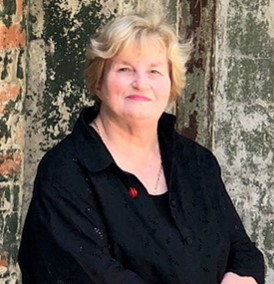This week, we reached out to stalwart domestic violence advocate and CEO of the Red Rose Foundation, Betty Taylor. Betty was typically generous with her time and in sharing the rich knowledge she has developed after almost 30 years working across the domestic violence sector. Betty spoke about what it means to be an activist, why it continues to be necessary and about the legacy of the Red Rose Rallies.
Q. This Sunday, 25th November marks the beginning of 16 Days of Activism against Gender-Based Violence. What does activism mean to you?
A. Activism to me means taking social action around an identified problem. In terms of violence against women, I have always loved the United Nations mantra: Think Globally, Act Locally. Addressing violence against women in the context of activism, we can’t work with women on an individual basis without wanting to change the systems of oppression that impact violence against women. We hear lots of talk about how to empower women, but what they really want and need is to be liberated. Our patriarchal system of society dominates women in all spheres of their lives – public and private. We can work with a women in a relationship and help her to escape that violence, but still, she is not safe – not safe on the street, at work… Activism is all about trying to change those systems and structures.
Q. A simultaneous Red Rose Rally was held in Brisbane, Cairns, Mackay and Melbourne recently with hundreds attending to honour the 12 women who lost their lives to family violence in October. Describe how it feels to have created a legacy that so many people now get behind and get involved in.
A. We started holding Red Rose Rallies 10 years ago, and have consistently held one following each death of a woman. The Rallies are not a protest; they are marking the outrage that is part of activism in saying here’s another women that’s died and another women that’s died. We have conversations about strawberries and about sharks but at what point does violence against women become a national crisis? To see the Rallies grow and to be supported by both sides of parliament, with more social media reporting now – it is leading to more awareness. We are keeping the conversation going.
Q. In 2008, you wrote a discussion paper titled ‘Dying to be Heard’ as part of your work on the Domestic Violence Death Review Action Group. What can each of us do, to be voices for those women no longer with us?
A. Ten years on and sadly women and children are still Dying to be Heard. We know that domestic and family violence deaths are largely predictable and preventable. We best honour those who have died by working for change on a political and societal level so that violence and abuse is not tolerated or excused ever/ anywhere. Challenging the status quo is the central core of social reform. There are however many ways to do this: campaigns involving lobbying and petitioning; protests; street demonstrations; and other methods. For the Red Rose Foundation this is a combination of Red Rose Rallies which provides a public space to remember those who have died while also bringing to public attention that stark reality of the enormous toll of violence against women.
Q. Is there still a need for activists in the context of violence against women?
A. There are still too many women living with horrendous violence and we owe it to them to speak up and speak out.
About the Red Rose Foundation
The Red Rose Foundation actively works to end domestic and family violence related deaths in Australia including homicide, suicide and accidental deaths that arise from incidents and/ or histories of domestic violence.

